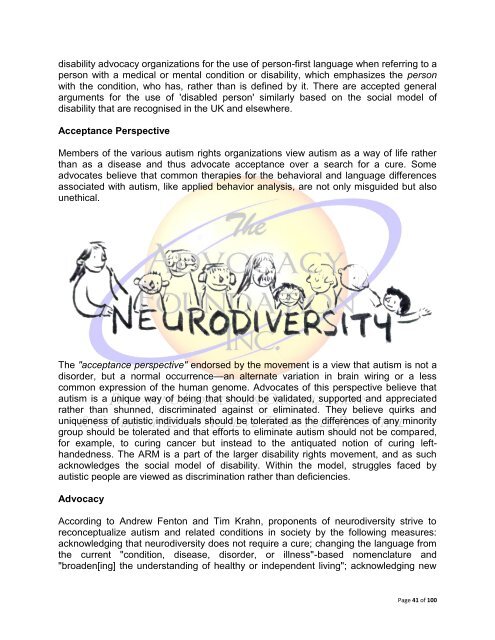Overcoming Dyslexia
Overcoming Dyslexia
Overcoming Dyslexia
You also want an ePaper? Increase the reach of your titles
YUMPU automatically turns print PDFs into web optimized ePapers that Google loves.
disability advocacy organizations for the use of person-first language when referring to a<br />
person with a medical or mental condition or disability, which emphasizes the person<br />
with the condition, who has, rather than is defined by it. There are accepted general<br />
arguments for the use of 'disabled person' similarly based on the social model of<br />
disability that are recognised in the UK and elsewhere.<br />
Acceptance Perspective<br />
Members of the various autism rights organizations view autism as a way of life rather<br />
than as a disease and thus advocate acceptance over a search for a cure. Some<br />
advocates believe that common therapies for the behavioral and language differences<br />
associated with autism, like applied behavior analysis, are not only misguided but also<br />
unethical.<br />
The "acceptance perspective" endorsed by the movement is a view that autism is not a<br />
disorder, but a normal occurrence—an alternate variation in brain wiring or a less<br />
common expression of the human genome. Advocates of this perspective believe that<br />
autism is a unique way of being that should be validated, supported and appreciated<br />
rather than shunned, discriminated against or eliminated. They believe quirks and<br />
uniqueness of autistic individuals should be tolerated as the differences of any minority<br />
group should be tolerated and that efforts to eliminate autism should not be compared,<br />
for example, to curing cancer but instead to the antiquated notion of curing lefthandedness.<br />
The ARM is a part of the larger disability rights movement, and as such<br />
acknowledges the social model of disability. Within the model, struggles faced by<br />
autistic people are viewed as discrimination rather than deficiencies.<br />
Advocacy<br />
According to Andrew Fenton and Tim Krahn, proponents of neurodiversity strive to<br />
reconceptualize autism and related conditions in society by the following measures:<br />
acknowledging that neurodiversity does not require a cure; changing the language from<br />
the current "condition, disease, disorder, or illness"-based nomenclature and<br />
"broaden[ing] the understanding of healthy or independent living"; acknowledging new<br />
Page 41 of 100

















